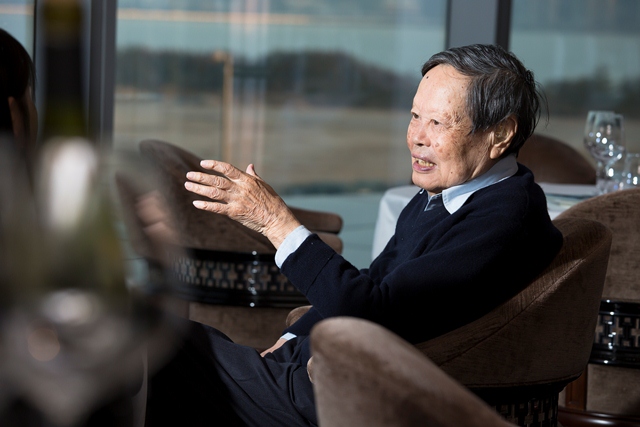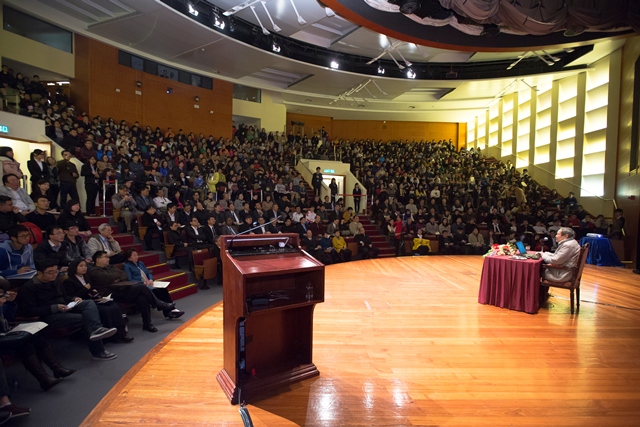Source: umagazine
“The situation the physicists found themselves in at that time was like a person being locked in a pitch-black room, where he knew with certainty that there was a door somewhere that would lead him out, if only he knew the right direction; but which was the right direction?” Like the physicists described in his autobiography, Chen Ning Yang was once fumbling in this pitch-black room, bumping his head again and again while trying to figure out the right direction. In 1957, Chen Ning Yang and Tsung-Dao Lee discovered that “parity conservation,” which until then was believed to be one of the fundamental geometric conservation laws that applied to all events, did not hold true in some cases, and they proposed the idea of “parity non-conservation” and suggested experiments to test their hypothesis. Because of their “penetrating investigation of the so-called parity laws which has led to important discoveries regarding the elementary particles”, they became the first two Chinese to receive the Nobel Prize in Physics. In February 2014, Prof. Yang visited the University of Macau to give a lecture entitled “My Experience as Student and Researcher”, in which he shared his road to winning the Nobel Prize. On the day prior to the lecture, Prof. Yang gave an exclusive interview to umagazine to talk about the role his university education played in winning the Nobel Prize.
Y: Chen Ning Yang | U: umagazine
U: You stayed at Princeton for 17 years, where you experienced, as you once put it, a three-step process, “interest→preparation→breakthrough”. Did you ever get tired, physically and mentally?
Y: Doing the kind of research that we do, “tired” is a word that never crosses our minds, because the subjects that interest us often have something fascinating about them. In other words, we are driven by our interests, so even if we don’t always succeed, we never get tired. For some athletes, they need to consciously use their willpower to persevere through the training, but it’s not the case with scientific research. Those who are engaged in scientific research often are greatly interested in what they do, and the interest itself is an enormous pull, so you don’t get tired or confused. Of course, sometimes when you have an idea, you rack your brains, do some research and calculations, but end up not getting anywhere, you could feel a little frustrated, but I wouldn’t say that’s a painful process.
U: What’s the most frustrating thing for a researcher?
Y: I think the most frustrating thing for a researcher is if he has a problem but just can’t solve it no matter if he tackles it from left or right. For example, in 1956, all the leading researchers in our field were trying to solve the “θ-τ puzzle”. At that time we felt like we were in a pitch-black room, and we knew there was a door somewhere, but we didn’t know which direction to go. In a dark room, you don’t know if you should go forward, backward, to the left or right, and that’s the most frustrating thing, but again, I wouldn’t say that was a painful experience. Sometimes, after thinking for a whole day, maybe I would decide to try right, and so I would fumble in that direction, but usually without any success, so I would think, maybe I should try left instead. Every researcher goes through this kind of experience.
U: What kind of personality and attitude towards learning do you think a researcher or student should have?
Y: I think it varies from person to person, and depends on the subject of research as well as the historical period in which the research is conducted. For example, in the 20th century, the division was quite clear—it still is in the 21st century—we have theoretical physicists and experimental physicists, and I belong to the first group. Sometimes, theoretical physicists lead the development of physics, which means new ideas are proposed by theoretical physicists. But at other times, it is the experimental physicists that make new discoveries which point to new directions. So, the answer to “what is the greatest driving force in a given field” depends on the specific historical period. And of course, even in the same group, different people have different preferences regarding research subjects and methods. Because of the differences in historical periods, personalities, and research styles, the chances of success tend to vary. So it’s a very fluid situation with many variables.
U: Do you think it’s very important for experimental physicists and theoretical physicists to work together?
Y: Absolutely. When I was a graduate student, which was in the 1940s or 1950s, we already knew several elementary particles, which are what the world is made up of. But during those few years, some experimental physicists discovered some particles they had never seen before, and because these particles were not what experimental physicists or theoretical physicists had expected, they were given the name “strange particles”. So, in the 1950s, these strange particles became the hottest subject of research. Physicists tried to find out what they were, what characteristics they had, and whether there were more of them. These questions were inspired by experimental physicists; the strange particles were not proposed by theoretical physicists. So this is an example of how theories need experiments, and of course there are also many examples of how experiments need theories.
U: Experimental physicists and theoretical physicists have different ways of thinking. Will this pose any difficulty for their collaboration?
Y: Different people have different experience, which will of course make collaboration a little difficult. Besides, different people have different values, which will make collaboration even more difficult.
U: You once said, debating questions with your classmates at the National Southwest Associated University(NSAU) fuelled your passion for physics and deeply influenced your way of discussing questions. Could you talk a little bit about this?
Y: The most intense debates tend to be about fundamental issues. It’s like two countries having an altercation. If it’s about something inconsequential, maybe you could just let it go, but you can’t give up just like that with big issues. My experience is that if you are a student and you have difficulty understanding something, it’s better to discuss or even debate with your classmates.
U: What role have your universities played in your life as a student?
Y: I learned a lot of basic physics theories at NSAU. The physics programme was very strong and very well taught at NSAU. The university put a lot of thought and effort in the teaching of physics. That gave me a solid grounding in physics. It’s like building a house—first you need to drive sufficient piles into the soil to provide foundation support. After I went to the University of Chicago, I found that the ethos in the physics department there was completely different from that of NSAU. The University of Chicago was more interested in new phenomena than in classic knowledge of physics. I have benefitted both from the solid teaching at NSAU and from the good research atmosphere at the University of Chicago. So these two universities have played an extremely important role in my life.
U: You said that the University of Chicago is like an important mentor to you. What about the solid grounding NSAU gave you? Is that also very important?
Y: Yes of course. I had many American classmates at the University of Chicago, and they didn’t learn as fast as I did, because they didn’t have a solid foundation like me.
U: Chinese universities tend to focus on teaching and encourage students to read more, while universities in Western countries tend to encourage peer discussion. What kind of university do you think is good for the students?
Y: From a student’s point of view, if the school can lead him or her in a direction that has enormous potential and suits the student, then it’s a good school. Conversely, if a school leads the student in a direction that turns out to be more and more difficult, then it’s not a good school. Of course, a student might ask, how do I know if a school meets this criterion? There can’t be any satisfactory answer to this question, but before applying, a student must know the school’s track record in teaching.
U: So does it mean that if a school wants to fulfil this purpose, it needs to have outstanding teachers to provide good guidance to the students?
Y: Yes, and this is very important, whether for science or social sciences. The head and veteran professors of a department must be able to identify the most promising areas for their department, and then they should focus on these areas and recruit the best teachers in these areas. If they can do this, in about five to ten years, their department is likely to become an influential department in these areas. Conversely, if the department head and the veteran professors make a wrong decision and focus on an area with no future, it would have a detrimental effect on the department and the students.
About Chen Ning Yang
Chen Ning Yang shared the 1957 Nobel Prize in Physics with
his long-time collaborator Tsung-Dao Lee. They were the first two Chinese to
win the Nobel Prize. Born in Anhui province, China, Chen Ning Yang’s interest
in physics was kindled by The Mysterious Universe, a book he read in middle
school. After graduating from the National Southwest Associated University, he
went to the United States to pursue further studies. After graduation he
carried out research work at the University of Chicago and Princeton
University. Later he taught at the State University of New York at Stony Brook
for more than three decades. He has made significant contributions to various
fields of physics, including statistical physics, condensed matter physics,
quantum field theory, and mathematical physics. In addition to the famous
“parity non-conservation”, he also proposed the Yang-Mills theory with Robert
Mills, which has had a profound impact on basic physics.



